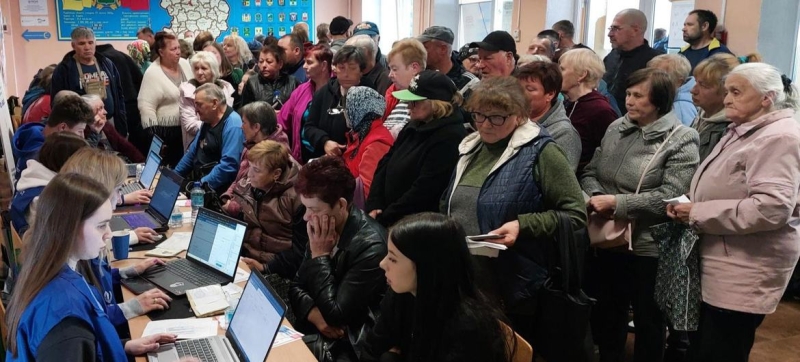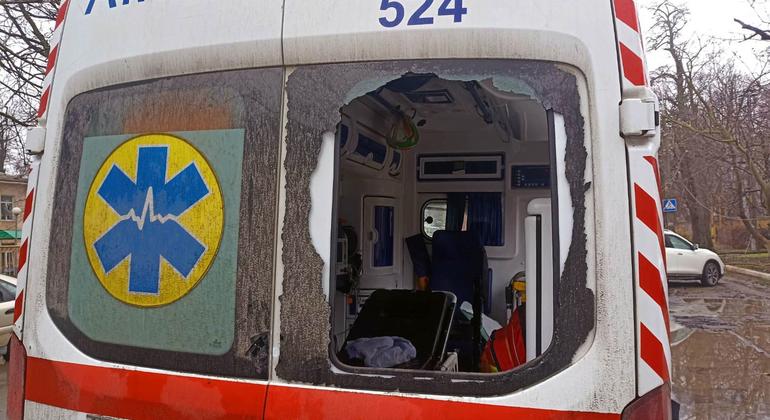
Transit center for displaced persons in Kharkov. Ukraine: Needs for humanitarian and medical assistance are growing rapidly amid escalation in the Kharkiv region Peace and Security
Since May 10, due to the escalation of hostilities and airstrikes by the Russian Federation, more than 16 thousand people have fled the most affected settlements in the Kharkov region of Ukraine. This was reported by the UN Office for the Coordination of Humanitarian Affairs (OCHA).
Spokeswoman for the Office of the United Nations High Commissioner for Refugees (UNHCR), Shabia Mantu, during a briefing at the Palais des Nations in Geneva, said that over the past week, more than 10,300 people were evacuated by the Ukrainian authorities from the border areas of the Kharkov region under support of volunteers and humanitarian organizations.
According to her, most of the evacuees were elderly and people with disabilities who could not leave on their own and were forced to leave their homes with only a few belongings.
Read also:
INTERVIEW | “It is difficult to describe in words” the scale of the tragedy in the Kharkov region
Local authorities and humanitarian organizations, including UNHCR and its partners, quickly set up a transit center in Kharkov. There, evacuees are registered as internally displaced persons and are provided with various types of humanitarian assistance, including psychosocial, legal and financial support.
Attacks on Energy system
The agency is concerned that conditions in Kharkiv—Ukraine’s second-largest city, which has already hosted some 200,000 internally displaced people—could become even more difficult if airstrikes and ground offensives continue. At the same time, more and more people continue to flee from front-line settlements in the Donetsk, Sumy, Zaporozhye and Kherson regions to the central and western regions, Mantu added.
Last week, an air raid warning was announced in Kharkov, which lasted 16 hours without a break, Mantu recalled. She added that attacks on energy infrastructure are especially critical in Kharkov, where energy supplies are already operating well below standard capacity.
“In order for UNHCR and its partners to respond to the current situation, it is critical that donors provide reliable and flexible funding for our humanitarian and recovery programmes,” the OCHA spokeswoman said. This includes supporting winter response efforts, as it is estimated that damage to energy facilities will significantly increase the need for humanitarian assistance during the cold season, she said. However, as of the end of April, donors had provided only 16 percent of the total $598.9 million needed by UNHCR in Ukraine.
Emergency assistance
In turn, WHO representative in Ukraine Jarno Habicht said that since the beginning of the full-scale Russian invasion, an average of 200 ambulances per year are damaged or destroyed as a result of shelling, which deprives the population of access to emergency medical services.

According to him, on Sunday, as a result of a missile attack on the outskirts of Kharkov, 11 people were killed and many others, including a paramedic, were injured.
Jarno said WHO has already prepared more than 22 metric tons of medical supplies for the treatment of acute injuries and chronic diseases and surgical interventions. The organization has also deployed additional staff to the Kharkiv region in response to growing needs. In addition, WHO funds intensive care teams and ambulances and provides training to health workers.
“With more than 40 organizations on the ground providing or other support, the coordinating role of WHO is more important than ever,” Jarno emphasized. >“Now is the time to prepare for next winter and ensure the functioning of Ukraine’s health system in a protracted crisis,” the WHO representative added. In particular, since the beginning of the year, with support from the German government, WHO has begun installing heating systems in a number of hospitals.
At the same time, the organization continues to build the capacity of health workers in the areas of mental health and psychosocial support , along with intensive training programs and modernization of physical rehabilitation facilities throughout the country.
Given that it is estimated that more than 10 million Ukrainians require psychological assistance, and since the full-scale Since the invasion of the Russian Federation, more than 20 thousand amputations have been performed in 2022, the needs in these two areas are enormous, Jarno noted.
“The people of Ukraine are its most important capital, and we must ensure that it is protected by a sustainable, patient-centred healthcare system,” he said.
